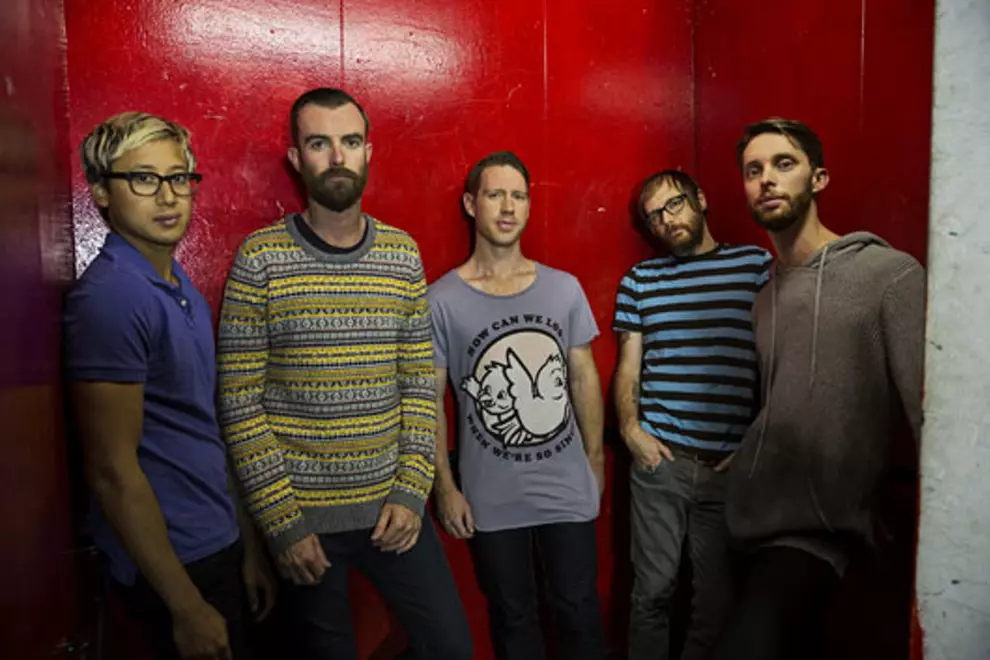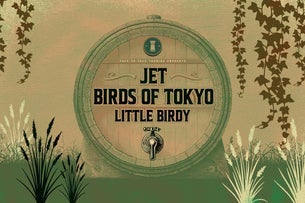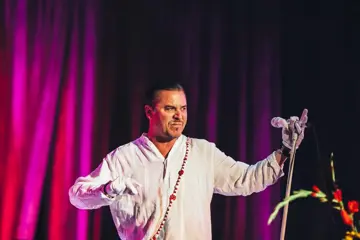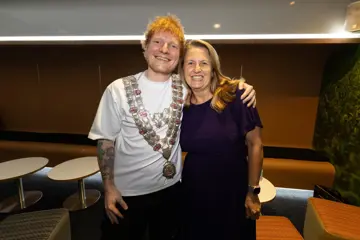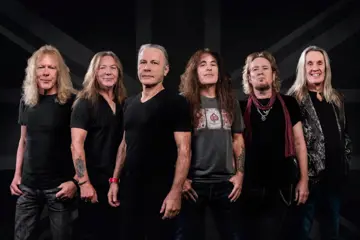 Birds Of Tokyo
Birds Of TokyoFive years and three albums into a career, Birds Of Tokyo have established what you might describe as a blueprint for their sound. Going into the studio to record album number four, March Fires, the band decided to scrap it, reinvent themselves and create an almost entirely new blueprint.
“I think it's just the desire to keep growing as artists, you know,” guitarist Adam Spark suggests. “This is all we do, so if you're gonna hang your hat on something when you die and, you want to define yourself by something in some small way, I guess you wanna at least know that you kept contributing to your little zeitgeisty moments and, I don't know, it felt it would be relevant and you're learning, I guess. A desire to learn, hey?”
“I think so,” singer Ian Kenny chips in. “We're kind of sort of 30-something year old guys asking ourselves why are we writing music? Why are we at album number four? Sort of looking at ourselves in our worlds and our little societies. We understand we have an audience these days, so the fact that that's getting to the place it is, we feel a bit more of a responsibility with that. So it just felt right to kind of have those conversations, those human-to-human conversations, that communal sense on this record of a call to arms sort of thing. It just made sense, it just felt right. As soon as we started writing in that direction, it was just speaking volumes to us.”
Of course, it's all very well deciding to reinvent yourself, but which way to go? “What initially was informing us,” Spark takes up the question, “is we kept coming back to a certain group of songs, bits of music, melodies, and even before the final sort of lyrics were completed for it, there was always this element of, like, the 2013 version of some sort of secular gospel thing or like a field song or something very simple cadence-y musical sort of movement, literally like C, G, C, G, C, D on a piano sort of thing and the melodies that Kenny was coming up with, they just all were feeling, yeah, just kind of spiritual in some way. And then we thought, well, the obvious thing to do is to go and make a folkie-sounding thing and that's not us, so we thought, this is where it's going – it was informing us as much as when we started informing the other bits of material that weren't like that, and it kind of started feeling like a bit of a no-brainer when it came time to actually piecing together the 'wire' of each song. And if you're gonna talk about anything relevant in your life, you may as well talk about things that you talk about amongst yourselves as friends every day, which is what we do.”
Don't miss a beat with our FREE daily newsletter
While ostensibly a three-piece comprising Kenny, Spark and drummer Adam Weston until they relocated from hometown Perth, where they formed in 2004, to various cities across the Eastern Seaboard, and officially became a five-piece, keyboards player Glenn Sarangapany has been with them for four years, and bass player Ian Berney took up the role from a departing Anthony Jackson in 2011.
“Glenn is a contributing writer now and was a lot on this record,” Sparks explains, “and Ian, we were very lucky there, very fortunate in the transition. He's such a sort of clued-in guy, excited about music, so the band, prior to walking into this record was feeling the best it has in some time, it was just feeling right, and it wasn't much of an effort, the five of us as we are, to actually work on the record together.”
The 'teaser' EP, This Fire, released last October, was the first indication of the sonic change Birds Of Tokyo had undergone during the three years between 2010's self-titled album and March Fires.
“It was primarily [latest single] Lanterns and This Fire that… We always kind of made the joke,” Sparks chuckles, “it sounds grotesque to say it but we always made the joke, going, 'It doesn't matter about the rest of the record as long as we've got Lanterns and Fire!' It was clearly a joke but it was more, I guess metaphorically speaking, that they were the sort of signposts for the record, emotionally or stylistically, that sort of said to the other ones, 'Hey, if you're gonna come up and hang out on the penthouse level with us as it were, you've gotta kind of speak our language', kind of thing. The music and the identity were there earlier than a lot of the other pieces, but the narrative of the songs came later.”
“It's not really a conceptual record,” Kenny expands, “but the kind of themes through the record are again about this sort of communal little landscape that we've set up on this record, and this sort of human-to-human connection and communication. I mean we're here to sort of speak about how we see things on our day-to-day basis – even the smallest of action can affect the biggest sort of reaction. It's not so much political – it's not really about that – but again, it's just small day-to-day statement stuff about us as people, just to try and explore that sense of community and communication – why do certain songs and why do certain words make you feel like you're part of something? It doesn't have to be huge but you still feel connected.
“It is a big canvas. Luckily we were able to play with that over sort of ten pieces of music, and that's where we get to sort of spread that out and pick up parts of the general conversation happening there. But I guess it just harps back to us, where we're at personally. The band's in a pretty good place actually, personally as a band, so it's not so much about the micro stuff, it's thinking about the macro and sort of zooming out and having a look at where we sit, and why do we sit in this space.”
“I think if it was overtly political,” Sparks adds, “or overtly dealing with 'events' per se, I guess, that's when it would feel really grand. Our way, which we always kept trying to do with the record, was how do we allow this to feel as big and communicative as possible whilst kind of keeping our cool about it and not going too over the top with, I guess, content or whatever. If we were to turn around singing about 'the one percent' and all this sort of stuff, it's very obvious – it's completing what we call in our band the little obvious triangle,” and he makes a triangle with his hands. “We're always trying to keep one of [the sides] not touching, and that's a big thing for us.”
Birds Of Tokyo will be playing the followeing dates:
Wednesday 27 February – University of Ballarat, Sport & Rec Centre (Mt Helen Campus)
Thursday 28 February – Pier Live, Frankston
Friday 1 March – Kay St, Traralgon
Saturday 2 March – The Forum, Melbourne
Tuesday 5 March – HQ, Adelaide
Thursday 7 March – Prince of Wales, Bunbury
Friday 8 March – Fremantle Arts Centre
Sunday 10 March – Breath Of Life Festival, Launceston
Tuesday 12 March – UC Refectory, Canberra
Wednesday 13 March – Waves, Wollongong
Friday 15 March – Panthers, Newcastle
Saturday 16 March – Enmore Theatre, Sydney
Sunday 17 March – Enmore Theatre, Sydney
Tuesday 19 March – Laurieton United Services, Laurieton
Wednesday 20 March – Plantation Hotel, Coffs Harbour
Thursday 21 March– The Tivoli, Brisbane
Friday 22 March – The Tivoli, Brisbane
Saturday 23 March – Coolangatta Hotel, Gold Coast

